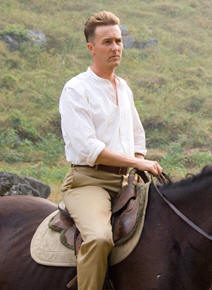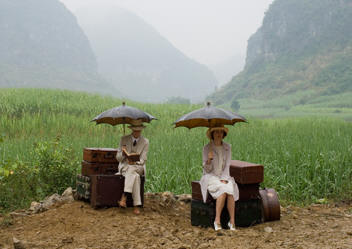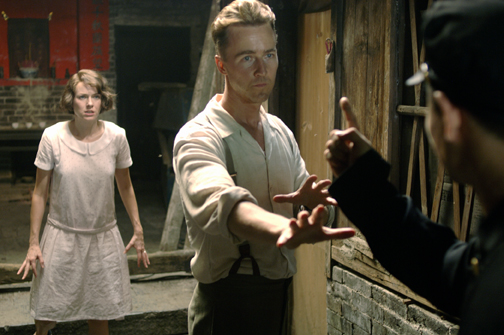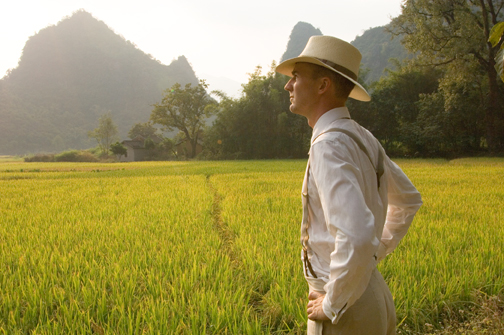

PopEntertainment.com >
Feature Interviews - Actors >
Feature Interviews K to O >
Edward Norton

Edward Norton
Lifting the Veil
by Jay S. Jacobs
Copyright ©2006 PopEntertainment.com. All rights reserved.
Posted:
December 29, 2006.
When
you think of actor Edward Norton, chances are you think of gritty modern
urban dramas Ė like Fight Club, American History X, The 25th
Hour, The Italian Job, The People vs. Larry Flynt or Primal Fear.
The always interesting actor has been looking backwards in 2006,
though, doing two straight period pieces. Earlier
in the year, Norton starred with Paul Giamatti and Jessica Biel in the
old-fashioned magician drama The Illusionist.
His
newest project is a labor of love. Norton has been trying to get together
an adaptation of the classic W. Somerset Maugham book The Painted Veil
for years. He has worked with screenwriter Ron Nyswaner
(Philadelphia) for about seven years to update
the story of a British doctor in the 1920s who learns his wife has had an
affair and drags her to a Cholera-plagued town in China.
ďItís been a long process,Ē acknowledges Nyswaner. ďOn the
script, Edward encouraged me to embrace the central theme, which is the
grace that comes with forgiveness. In a book, which has a narrative voice
and explains whatís going on in someoneís head, you actually can have the
luxury of having characters who remain very, very bitter until the end. You
somehow rise above that bitterness and have that experience. In a movie,
you have to embrace one thing or the other. I think we moved away from
Walterís bitterness so that we could make him ultimately pull forward. Itís
about transformation.Ē
Norton knew from early on that Naomi Watts would be the perfect actress to
play Kitty, the spoiled wife who learns to respect her husband in the midst
of tragedy. Watts signed on right away and
suggested an old friend, John Curran, as director.
Curran had previously directed her in We Donít
Live Here Anymore.
ďMy
process is to find out their process always,Ē says Curran. ďI really donít
think I have some sort of magical genius that I can give Edward Norton
thatís going to make him a better actor, you know? The best thing I can do
is create an environment that inspires him and then just get the hell out of
the way. Thatís kind of the way I view it.Ē
Edward Norton sat down with us at the Regency Hotel in New York a couple of
weeks before The Painted Veil was to open nationwide.
Can
I start by asking you about filming in China and what it was like?
It
was a great experience. I think when you make movies, a lot of times the
artifice of the experience is very present all around you. So youíll be
creating a reality when you step out of work or head home. Itís not that
often that the experience of making the movie has a lot of parallels to the
experience the movie has in the story. But, it was in this case. We were,
obviously, far from home. We were working through the difficulty of
translation. Sometimes the inefficiency of communicating that way. People
doing things differently than youíre used to. Having your own problems
being away because youíre often in another context. A lot of it said very
directly what the story is about, and that was special. Other than that, it
was great. You know, there are attendant frustrations to making anything
way out in places where there arenít any paved roads and things like that.
But those logistical challenges were minor compared to I think how great the
Chinese crews and our colleagues there were amazing. They were really
good. Their work ethic is unbelievable.
 What was it about the film that caused you to want to do it?
What was it about the film that caused you to want to do it?
For
me, it was a combination of two things. One is thatÖ if you watch David
Lean films, or Out of Africa, selfishly, you
canít help but think how great it would be to have that kind of experience.
So, when you see the potential in something for that kind of scope, itís
very tempting. But, the best of those movies, I think, are the ones that
have themes at the heart of them that transcend the period. When I read it,
I found myself more moved by this story of these people going through the
process of losing their illusions about each other and managing to recover a
deeper sense of each other. I related to it more than I tend to relate to
stories about wedding planners and things like that. For me, it was the
combination of the epic scope of the film but with but with a set of themes
at the heart of it that held it together.
Were you familiar with
Somerset
Maughamís writing before?
I
had read a few of his things. I had not read The Painted Veil. I
read Ronís script before I read the book. I went back to the book and then
in a way moved on with the script. Up and away from the book.
Your character is really different from the book. A lot more extreme in the
movie, I would say. With adaptations, how did you change?
In
some ways, I think the Walter of the book is more harsh. In the sense only
that in the book, many of the same things that happen in the movie happen,
but they happen in different ways. In the book, she has to go back to
Charlie after his death and sleep with him again before she realizes how
thoroughly awful he is. In the movie, we moved that recognition further
forward. In the book, the impact of the experience with Walter finally
lands when she goes home and in some ways confessesÖ asks for
forgiveness from her father. In the film we made that happen between her
and Walter, before his death. But as Ron said, we never wanted to abandon
the basic idea of a woman confronting the limitations of her view of life.
We wanted to let those changes take place between those two characters.
 What
do you particularly like about this character?
What
do you particularly like about this character?
About Walter? Well, itís not so muchÖ I think I understand what youíre
saying, but I never look at a character and decide whether Iíd like to have
a beer with himÖ
No, I mean as an actor, why is he an interesting role to play?
Just
that he has so many levels to him. Heís a character who on first
impression Ė much as she perceives him, the audience has a chance to perceive
him Ė heís a little bit antisocial and heís very cerebral. As the
story goes on, these kind of unsuspected depths keep getting revealed in
him. The depth of his passion. The depth of his capacity to be hurt. To
be vengeful. He becomes almost violent... certainly psychologically
violent. That too, even gives way to a kind of humility and compassion that
you donít see in him in the beginning. So as an actor, you sit there
looking and go, wow, this guy is quite an onion, you know? He keeps going
layer to layer. I think Kitty [is] equally [complex]. Thatís what makes it
a very complicated little dance that those two do.
Can you explain how Chinese culture inspired you?
I
should say, I didnít go looking for a film about China. The fact that I had
some background in China just made it more appealing because I had
encountered it. But, you know, at the moment it happens to be the biggest
country on Earth. (chuckles) Itís also one of the oldest cultures
on Earth. In a lot of ways, China is a lot like America, in the sense that
itís too vast to really encompass. Usually people are going to make general
statements about it. Itís geographically diverse, like America. Itís
ethnically diverse, like America. It has this deep, deep history. So to me
itís a fascinating place. Also, right now, this is what the storyís about Ė
itís in flux. Itís a place where enormous changes are happening. Itís
palpable. The moment when the story takes place, it was another moment in
which change was ripping across that country and people were
asserting their right to throw off the shackles of other countries meddling
in their affairs. Itís an interesting component.
 So
the alien helped to reinforce their acclimation? That was important to
happen in China? Could it have been anywhere else?
So
the alien helped to reinforce their acclimation? That was important to
happen in China? Could it have been anywhere else?
I
think you can argue this could take place in a similar kind of historical
moment in another place. You could change anything in a number of books.
In this case, I think, itís not really a part of the book, but John Curran
brought a specificity to the historical moment in the film. Pushed me
and Ron to get more specific about when this was taking place and what was
going on. In part, because I think we thought that was smart because it
resonated with things weíre seeing today. But, also, to be honest, I think
itís just because John is a good dramatist and he looked at it and said how
can I create an environment around these characters that drives them closer
together. Beyond cholera, what could be going on? He found this moment in
Chinese history when foreigners were being attacked all over the country
side. You know, itís just good drama.
In the story Walter was doing things that the Chinese had issues with
spiritually. Did that happen in the filming as well, where there were
Western things they did not understand or approve of?
Well, to make sure itís not misinterpreted, the people in the town we were
filming in didnít get angry. The scene in the film is that Walterís
insistence on the bodies being removed violates the Buddhist tradition of
the body being allowed to rest so the spirit can depart. I think the
Chinese people we were working with; the more we gave voice to the Chinese
perspective on peopleís intervention on their affairs, the more the Chinese
people we worked with felt even more deeply connected to it. It was fairly
late in the process where we wrote that scene where Walterís saying to the
Colonel at the campfire, I donít get your beef with me. Iím here doing the
best I can. The Colonel says, I understand that, but your country is
pointing guns at our country. The more we gave the Chinese
perspective, the more it gave it resonanceÖ even for our Chinese
colleagues.
Can you talk about working with Naomi?
Oh,
sheís supreme. I totally canít say enough good about her. Iíd say beyond
any film Iíve ever worked on
Ė the two performances were like in lockstep.
There was no way to do one without the partner. Without the other. They
are so intimately intertwined. Itís definitely the closest Iíve ever worked
on a day-to-day level with another actor. It was just fantastic, because
sheís so unafraid to work at levels of nuance. Itís really a challenge.
Itís really great. Because sheís putting things over so subtly.
Thereís
stuff in the film that she does that I just love. I love
that whole sequence with her and Diana Rigg, because sheís not really saying
that much, but you feel the impact of this perception of Walter washing over
her to the point where she walks out and kind of canít speak. That kind of
work is so important. Itís the best of what you can do in film
acting, because itís almost gestural. Itíd be like sheís got a great
feeling for how much the camera can draw out of you. I could not have had a
better partner.
 You
are very involved in environmental issues. Which Presidential candidate do
you think could do the most for the environment?
You
are very involved in environmental issues. Which Presidential candidate do
you think could do the most for the environment?
You
know, I think itís a complicated question. I donít have a glib answer for
it. I think I need to do a little more specific looking into what people
are proposing on those levels.
You said you and Naomi felt really in tune with one another. Could you talk
a little about how you got there and how you worked with John?
Well, Naomi and I talked for a couple of years. She was involved also for a
long time. A lot of times, we actually wrote a lot about it, which was
really interesting, because the differentÖ
Like letters to each other?
YeahÖ I meanÖ not pretending to be the characters or anything. Just kind of
noodling on what we related to. Also, because the script was always
developing Ė debating how far are we going to take this film? How overt is
the forgiveness? How much do you want them to say on the deathbed? What do
you need expressed? How much of it can be expressed in words? And how much
of it without words? All that kind of stuff. Then, of course, the both of
us relied on John enormously. She had a long relationship with John.
Theyíd known each other for fifteen years and had already done one film. So
that was great. We had to shoot this film profoundly out of sequence. Do a
lot of the deep scenes of their relationship in the middle of the movie
without having shot any of the beginning. That relies a lot on the director
going, ďDonít worry about hitting it perfect. Letís do pitch one here and
pitch one here and pitch one here and pitch one here and give me the raw
materials to sort it out later. I think that requires an enormous amount of
trust in a director. You have to be willing to essentially fail. Do a take
that may be clownishly wrong. You need a lot of trust among everybody.
Features
Return to the features page
